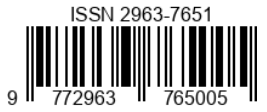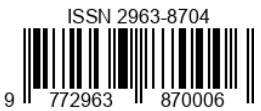Peran dan Tanggung Jawab Platform Digital dalam Upaya Pengenaan Pajak di Indonesia Era Society 5.0 Menurut Undang-Undang Harmonisasi Peraturan Perpajakan dan Undang-Undang Informasi dan Transaksi Elektronik
DOI:
https://doi.org/10.55606/jhpis.v4i1.4670Keywords:
Platform, Digital, Taxation, Society 5.0, VATAbstract
Technological advancements in the Society 5.0 era have transformed the economic landscape, including taxation mechanisms. This study focuses on the role and responsibilities of digital platforms in tax imposition in Indonesia, governed by various regulations such as the Harmonized Tax Law (UU HPP) and Electronic Information and Transaction Law (UU ITE). The study finds that while digital platforms are central to the digital economy, existing regulations have not fully addressed the complexity of their operations, particularly in the context of taxation. Using a normative juridical approach, this research examines key challenges such as transaction anonymity, taxation disparities between conventional and digital companies, and tax avoidance by multinational digital platforms. On the other hand, the Indonesian government has initiated adaptation efforts by imposing Value-Added Tax (VAT) on digital trade, although its implementation still faces technical and administrative barriers. The study concludes that Indonesia's tax regulations need reforms to better accommodate the dynamics of the digital economy, including implementing fair and legally certain taxes for digital platforms. Recommendations include strengthening oversight, enhancing international collaboration, and utilizing technology to improve transparency and efficiency in the tax system. This research aims to contribute to the government, regulators, and business actors in creating an inclusive and sustainable digital economic ecosystem.
Downloads
References
Aditya Zulmi Rahmawan, & Zaenuriyah Effendi. (2021). Implementasi Society 5.0 dalam kebijakan dan strategi pendidikan pada pandemi Covid-19. Jurnal Inovasi Strategi dan Model Pembelajaran, 2(1).
Ahmad M. Ramli, et al. (2022). Collaboration principles between telecommunication operators and over-the-top (OTT) platform providers in the context of the Indonesian Job Creation Regulation. Journal of Telecommunications and the Digital Economy, 10, March.
Amelia Cahyadini, et al. (2022). Pajak penghasilan bagi over-the-top di Indonesia: Sebuah peluang dan tantangan. Veritas et Justitia, 8, July.
Kazan, E., Tan, C.-W., & Lim, E.T.K. (2014). Towards a framework of digital platform disruption: A comparative study of centralized & decentralized digital payment providers. Proceedings of the Australasian Conference on Information Systems (ACIS 2014), Auckland, New Zealand.
Moslem Alimohammadlou, & Zahra Khoshsepehr. (2023). The role of Society 5.0 in achieving sustainable development: A spherical fuzzy set approach. Environmental Science and Pollution Research, 30.
Peraturan Menteri Keuangan Nomor 48 Tahun 2020.
Peraturan Pemerintah Nomor 80 Tahun 2019 tentang Perdagangan melalui Sistem Elektronik.
Safiranita, T., et al. (2022). Hak cipta dalam media over-the-top. Refika Aditama.
Safiranita, T., et al. (2023). Hak cipta dalam perspektif cyber law. Refika Aditama.
Soekanto, S. (2004). Faktor-faktor yang mempengaruhi penegakan hukum. Rajawali Press.
Suman Kumar, & Rajendra Prasad Meena. (2023). The rise of OTT platform: Changing consumer preferences. International Journal of Management, 14, July.
Tasya Safiranita Ramli, et al. (2021). Copyrighted content commercialization on OTT media in Indonesia. Journal of Intellectual Property Rights, 26, November.
Tasya Safiranita Ramli, et al. (2022). Pemanfaatan teknologi bagi siswa dalam menyokong peningkatan ekonomi digital dan upaya menghadapi era Society 5.0. ACTA DIURNAL Jurnal Ilmu Hukum Kenotariatan, 6(1).
Tri Mianto Dion Prasetiyo, & Sugeng Hadi Utomo. (2023). Pengaruh ekonomi digital platform digital dan pemasaran digital terhadap tingkat pendapatan UMKM go online di Kota Kediri. Jurnal Ilmu Ekonomi dan Studi Pembangunan, 23, July.
Undang-Undang Dasar Negara Republik Indonesia Tahun 1945.
Undang-Undang No. 28 Tahun 2007 tentang Perubahan Ketiga atas Undang-Undang Nomor 6 Tahun 1983 tentang Ketentuan Umum dan Tata Cara Perpajakan.
Undang-Undang Nomor 2 Tahun 2020 tentang Penetapan Peraturan Pemerintah Pengganti Undang-Undang Nomor 1 Tahun 2020 tentang Kebijakan Keuangan Negara Dan Stabilitas Sistem Keuangan untuk Penanganan Pandemi Corona Virus Disease 2019 (Covid-19) dan/atau dalam Rangka Menghadapi Ancaman Yang Membahayakan Perekonomian Nasional dan/atau Stabilitas Sistem Keuangan Menjadi Undang-Undang.
Undang-Undang Nomor 7 Tahun 2021 tentang Harmonisasi Peraturan Perpajakan.
Downloads
Published
How to Cite
Issue
Section
License
Copyright (c) 2024 JURNAL HUKUM, POLITIK DAN ILMU SOSIAL

This work is licensed under a Creative Commons Attribution-ShareAlike 4.0 International License.








